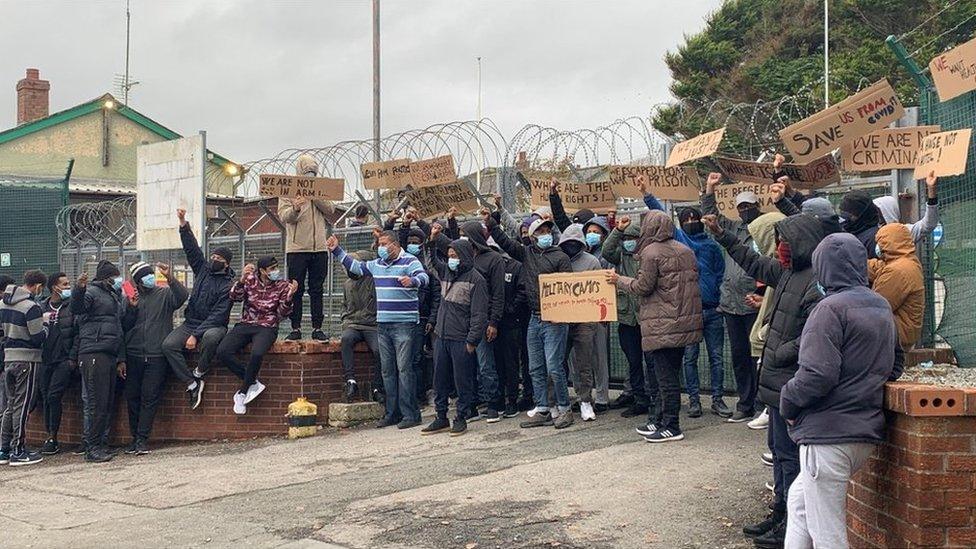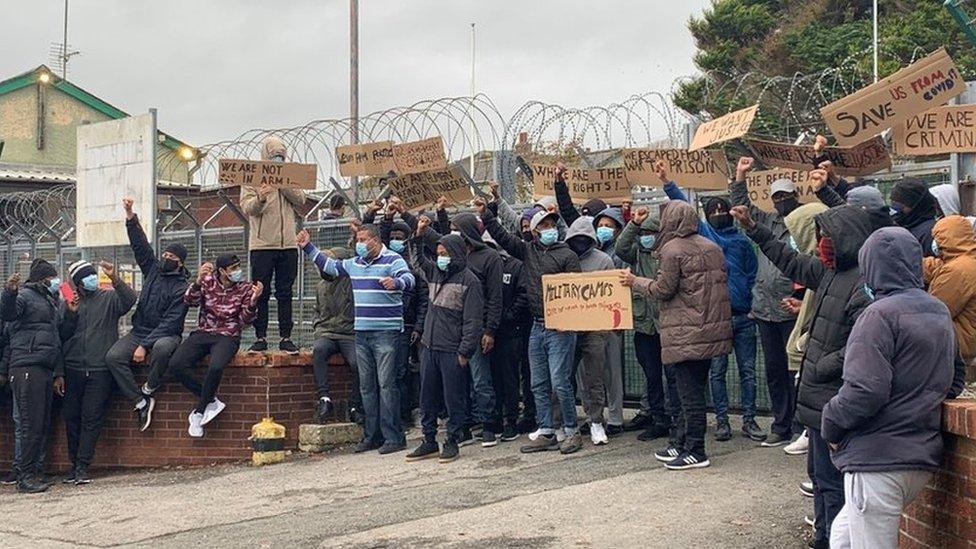Penally asylum camp: 'No cash help' fear for protest policing costs
- Published

Some asylum seekers housed at the camp had protested about conditions there
Police fear they will "not get a penny" towards costs of policing protests at a Pembrokeshire asylum seeker camp.
The centre at Penally is set to be closed after inspectors said it was "rundown and unsuitable".
Dyfed-Powys Police and Crime Panel said policing protests had cost £685,000. The Home Office said it had agreed to give a £2.5m grant to the force.
But the force fears it will not receive anything as it is not eligible for the grant due to how it is calculated.
Plans to house up to 250 asylum seekers at the former military centre from September last year had attracted protests and counter-protests.
It had been described as a target for "hard-right extremist" protesters by First Minister Mark Drakeford, and the men housed there have staged their own protests over conditions at the site.
With asylum seekers set to be moved from the camp in the coming days, Dyfed Powys Police and Crime Panel have repeated their calls for cash to cover "significant costs" associated with policing the centre.
Panel chairman Alun Lloyd-Jones has written to the Home Secretary Priti Patel, as well as to all MPs in the force area, calling for costs to be reimbursed.
In the letter to Ms Patel, Mr Lloyd-Jones said the centre had "taken up a large amount of officer time" which meant staff had been "diverted from other duties, leaving local communities at risk".
The Dyfed Powys Police and Crime Panel has heard that the cost of policing protests at the asylum seekers camp was £685,000 in officer hours and overtime.
The Home Office said it had already agreed to provide £2.5m of Special Grant funding to the force for the period up to September 2021.
The panel states that under Home Office police funding rules special grants can be given to cover additional pressures, but only if the total cost of these pressures exceeds 1% of the force's net revenue expenditure for the year.
This means the force could only be reimbursed for additional costs once it has exceeded £1.129m.

Inspectors raised concerns over cleanliness at Penally, and said some areas were filthy
Mr Lloyd-Jones said: "These decisions [to establish the asylum seeker camp in Penally] were made in London, and there was no consultation whatsoever beforehand.
"Now we've been told that until the threshold of £1.129m has been reached, then there will not be a penny coming from London.
"We've sent letters out to MPs and to the Home Office saying how unfair we believe this is.
"They should understand that if they make these decisions, which have implications for raising the police precept, as well as taking police away from their normal duties, then they must pay for those decisions."
The Home Office said that supporting police was a priority for the government, which was recruiting an extra 20,000 officers and had given forces £30m additional funding during Covid-19.
"We have already agreed to provide £2.5m of Special Grant funding to Dyfed-Powys Police up to September 2021 and their funding will increase to £122.3m next year," a spokesman said.
"We continue to work closely in partnership with the police, local authority and other stakeholders, with a clear focus on the safety and wellbeing of both those accommodated at Penally, which is paid for by the Home Office, and local residents."
The camp has attracted protests, with many saying housing them in the former army camp is not appropriate
Pembrokeshire County Council has also asked the Home Office to reimburse £83,858 in costs associated with the camp, made up of £65k in staff costs, more than £12,000 for "specialist support" and £5,495 for internal works including barriers.
The Home Office said it did not provide additional funding to local authorities anywhere in the UK in connection with any of the local costs incurred for accommodation for asylum seekers.
- Published18 March 2021

- Published16 March 2021

- Published11 November 2020

- Published27 January 2021
